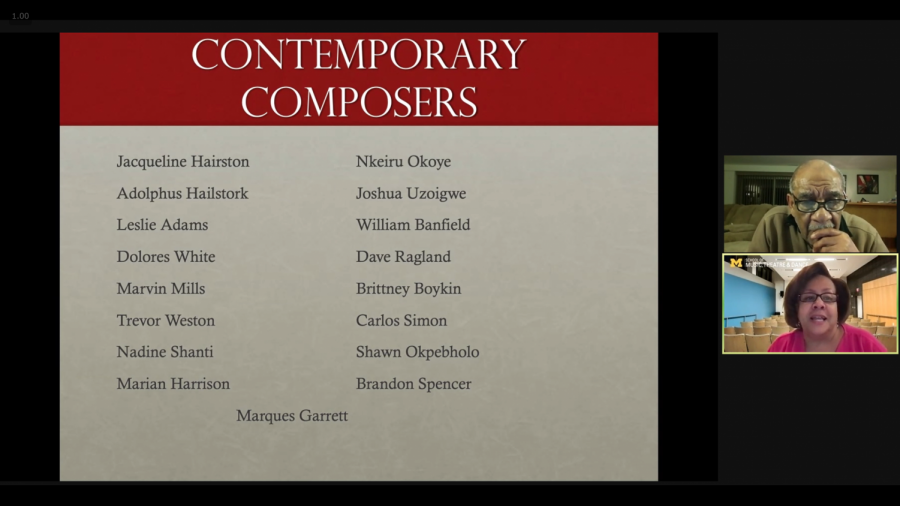Bienen event highlights importance of studying and performing Black art songs
Laya Neelakandan/The Daily Northwestern
Guest speakers Dr. Louise Toppin and Willis Patterson discussed the importance of Black art songs at a Bienen event Wednesday night.
April 7, 2021
Because Black composers did not get the opportunities to publish or record their songs, many people today are unaware of their music and don’t perform it, panelists said in a Wednesday event, highlighting the need to educate on and promote Black art songs.
In the event, moderated by the Bienen School of Music Dean Toni-Marie Montgomery, panelists Dr. Louise Toppin and Dr. Willis Patterson spoke about the importance of studying and performing African-American art songs, the barriers that prevent the spread of knowledge and the ways teachers and students can advocate for these composers and their music.
Toppin, a professor of voice at the University of Michigan’s School of Music, Theatre & Dance, started the event by asking the viewers to think about the number of composers they could list off the top of their head. Then she asked how many of those composers were Black, as a way to emphasize the lack of education and recognition surrounding Black composers.
To further illustrate this point, Patterson, the former associate dean of University of Michigan’s School of Music, Theatre & Dance, talked about how important it is to increase one’s knowledge of music of other identities.
“There is that tendency to feel some amount of awkwardness on the part of other ethnicities in this country because they don’t know the traditions,” Patterson said. “If you’ve developed a feeling of comfort with Italian art songs and German art songs… then we should feel less awkwardness about learning African-American art songs.”
Additionally, they spoke about the lack of accessibility to African-American art songs as a direct result of people of color not having the same opportunities to publish their work as their White counterparts. Because these composers were unable to get their scores published, the songs were not taught or played in concert halls, Patterson and Toppin explained, which prevented the songs from being heard and promoted.
Toppin also spoke about Black people’s hesitation to embrace their “Blackness” through studying African-American art songs because “they were trying to find their way in a society that was oppressive to them.”
“So you now are in a situation of no one taking ownership of this music because no wanted to own the fact that they could learn and present this music,” Toppin said. “It wasn’t until later periods that they started to embrace… the thought of, ‘I need to be proud of myself as a Black American to White America.’”
Toppin and Patterson then played excerpts from art songs by early and contemporary Black composers, including Harry T. Burleigh, R. Nathaniel Dett, William Grant Still and Chicago native Margaret Bonds (Bienen ‘33, ‘34).
The event concluded with a question and answer section, in which both Toppin and Patterson emphasized the need to increase awareness of and appreciation for African-American art songs.
“I am very hopeful of the future study of African-American art primarily because I’ve seen the evidence, and we have such wonderful young composers,” Patterson said. “These people are going to make wonderful performances.”
To further advocate for the promotion and performance of African-American composed songs, Toppin highlighted a database she created where anyone can find songs from the diaspora.
Ultimately, she said it’s most important for students to show interest in these songs and ask their teachers to study and perform them.
Dean Montgomery ended the event by thanking the two speakers and encouraging viewers to heed their advice and “take on the mantle.”
“This was a personal, memorable event for me,” Montgomery said. “I’m so enthusiastic about (this) presentation, and it’s more than we could have dreamed of.”
Emails: [email protected] and [email protected]
Twitters: @laya_neel and @D_Ramos42
Related Stories:
— In Focus: One year after petition, Bienen students, faculty push to diversify music curriculum
— Bienen alum uses music for political activism
— Bienen alumni create musical instruments for students with disabilities


